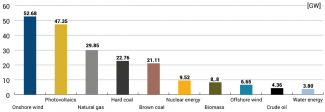Germany: The central government strikes a deal with the federal states on phasing out coal
A meeting concerning work on the coal phase-out act was held on 15 January at the Chancellor’s Office. The meeting was attended by representatives of the federal government and the ministers president of the federal states where brown coal power plants and open-cast mines are in operation. During the meeting, the ministers president approved of the schedule for decommissioning brown coal power plants which the government had negotiated with the power plant operators. Eight blocks which in aggregate have a capacity of 2.8 GW are expected to be deactivated in North Rhine-Westphalia by the end of 2022. The first power plant shut-downs in the eastern federal states will begin in 2028. The last blocks are planned for decommissioning by the end of 2038. The possibility of speeding up the schedule by three years is to be considered in 2026 and 2029. The operators (RWE and EPH) are expected to receive a total of 4.35 billion euros in compensation from the federal budget for decommissioning their power plants ahead of time.
The participants of the meeting also agreed that compensation would be paid to brown coal mine employees who are 58 and older for a transitional period until they reach retirement age. Furthermore, the central government and the federal states will sign an agreement to guarantee the payment of 40 billion euros for restructuring the coal regions as previously agreed. However, the agreement between central government and the federal states did not set a schedule for decommissioning hard coal power plants. The government is expected to pass a bill regulating the deactivation of coal power plants during the meeting on 29 January, and the legislative process should end by July 2020.
This was a top-level meeting – it was attended by Chancellor Angela Merkel (CDU), Vice Chancellor and Minister of Finance Olaf Scholz (SPD), Minister for Economic Affairs and Energy Peter Altmaier (CDU), Minister of the Environment Svenja Schulze (SPD), Head of the Chancellery Helge Braun (CDU) and the ministers president of: North Rhine-Westphalia, Armin Laschet (CDU); Brandenburg, Dietmar Woidke (SPD); Saxony, Michael Kretschmer (CDU); and Saxony-Anhalt, Reiner Haseloff (CDU).
Commentary
- The deal removed the last political obstacles on the way to passing the coal phase-out act. The guarantee that the decommissioning of brown coal power plants in the eastern federal states will not begin until 2028 (i.e. after the launch of the restructuring process) needs to be viewed as a success for the ministers president of Brandenburg, Saxony and Saxony-Anhalt. A new hard coal power plant based in Datteln will be connected to the grid, which is in line with the wishes of the minister president of North Rhine-Westphalia. However, this move is contrary to the recommendations concerning discontinuation of hard and brown coal combustion in Germany presented by the so-called ‘coal commission’ on 26 January 2019. The guarantee of the allocation of funds for restructuring changes independent of the future government was a joint achievement of the federal states.
- The ministers president of the federal states were able to approve the schedule for decommissioning brown coal power plants because the negotiations concerning earlier shutdowns of coal blocks and the discontinuation coal mining between the government and power plant operators had ended. Around 20,000 people work in this sector in Germany. However, as many as 70,000 people are employed in this sector indirectly.
- The decommissioning of coal power plants in Germany is seen as a key element of the climate policy and a milestone on the way to achieving the goal of reducing greenhouse gas emissions by 55% to 2030 (as compared to 1990). In 2018, the energy sector accounted for 36% of German emissions and was thus the largest source. Coal combustion is responsible for around 70% of the emissions in the energy sector.
- The Czech holding EPH will be one of the beneficiaries of the compensation. More precisely, it will be the mining company Mibrag which it owns and which is going to receive a major part of the 1.75 billion euros envisaged for eastern Germany. EPH also operates in Poland (Silesia hard coal mine in Czechowice-Dziedzice). Its owner, Daniel Křetínský, the fifth richest man in the Czech Republic, over the past few years has been pursuing a strategy of investing in coal mines and power plants in Western European countries (including Germany, France and the United Kingdom), many of which have been bought for symbolic prices. Most likely he assumed that this resource will remain an essential part of the energy mix for longer and that compensations for winding down companies could be expected as part of the coal phase-out process. Křetínský presumed that in the case of Germany the decision to decommission nuclear power plants – given the absence of consent to launch new coal power plants – would make it necessary to use the existing coal power plants at least as a support base for renewable energy sources. Some German coal assets (e.g. LEAG, which owns four power plants which satisfy a tenth of Germany’s electricity consumption and is the country’s second largest mining company) are controlled by Křetínský jointly with the Czech Republic’s richest man, Petr Kellner.
Additional research by: Krzysztof Dębiec
Chart 1. Structure of electricity production in Germany in 2018.

Source: AG Energiebilanzen e.V.
Chart 2. Installed power of German power plants in 2019.

Source: Federal Network Agency.





